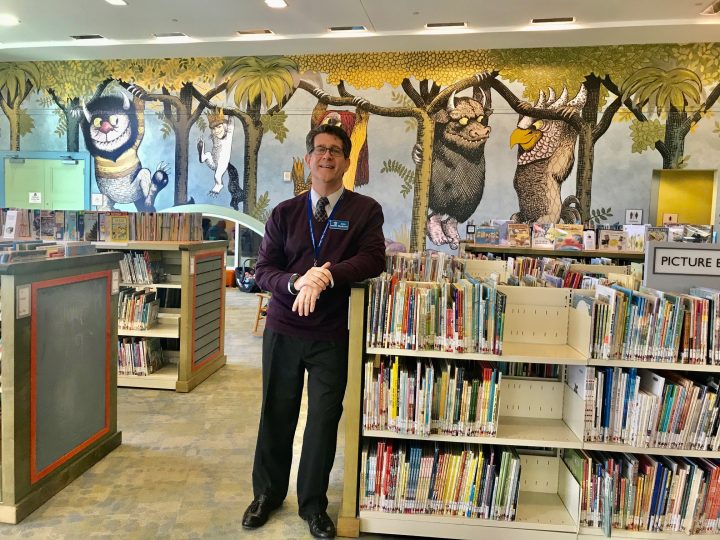
Director, Chattahoochee Valley Libraries
Why the decision to become a ‘fines free’ public-library system?
“Nationally, a lot of other library systems have done that. Not everybody has been paying as much attention to it as much as we could have in this profession—I’ve been doing this for 30-something years.
Fines are not a deterrent for people to bring materials back. When you realize there’s no cause and effect that goes on there, then it makes you step back and take a look. Further, if you start to look at parts of your community that are more socio-economically depressed, it hurts those folks even more than it does other people. We did a study and I talked to colleagues across the country who had already done it. Salt Lake City was a real good example. They had a lot of data and we looked at their data and then we started looking at our own data.
For me, the tipping point was knowing that 25% of people in the last two years who had gotten a brand-new library card, got it, checked something out, had a fine, and never came back. I’m losing market share. It’s easier to keep the customers we have than to get new ones. So we had a significant number of people who weren’t coming back. Why are we here if not to serve as much of the public as possible?
That, coupled with the fact that overdue fines were less than 1% of our overall revenue, anyway. We are funded by the Muscogee County School District and we’re very fortunate to have that arrangement. But you have to think about how much staff time it takes to chase down those quarters. Plus, you’re building negative relationships with people—some of the people that need to use the library the most. Start doing all the math and it just makes sense to think about doing away with them. It’s been four months now.”
How did y’all manage to orchestrate such an impressive calendar of programs for 2020?
“We have our community engagement department that does nothing but that forward-facing stuff for our community. We have a program and media-content coordinator who does nothing but coordinate all the programs in our system. And being able to have marketing folks to put all that together. All of this takes us about a year.
We got the NEA grant to cover most of the cost for [United States Poet Laureate] Joy Harjo. We’re splitting some of our costs with CSU’s Carson McCullers Center. It makes a lot of sense: we’re promoting reading, we’re bringing in big-name people, and we’re partnering with other local agencies.
On the flip-side of that, if you look at Delia Owens, we’re also partially funded by our private Library Foundation. And every year, they bring in as a benefit to the Founders Society members a big-name author as a guest at their gala. But part of bringing in that big-name author, they also build into the contract a day where they do a public event. So Delia Owens came in for that Thursday night private event, but then did a public-speaking engagement for the public on Friday morning. She’s a number-one New York Times best-selling author and has been for a while. We’re really pleased that she was able to come.”
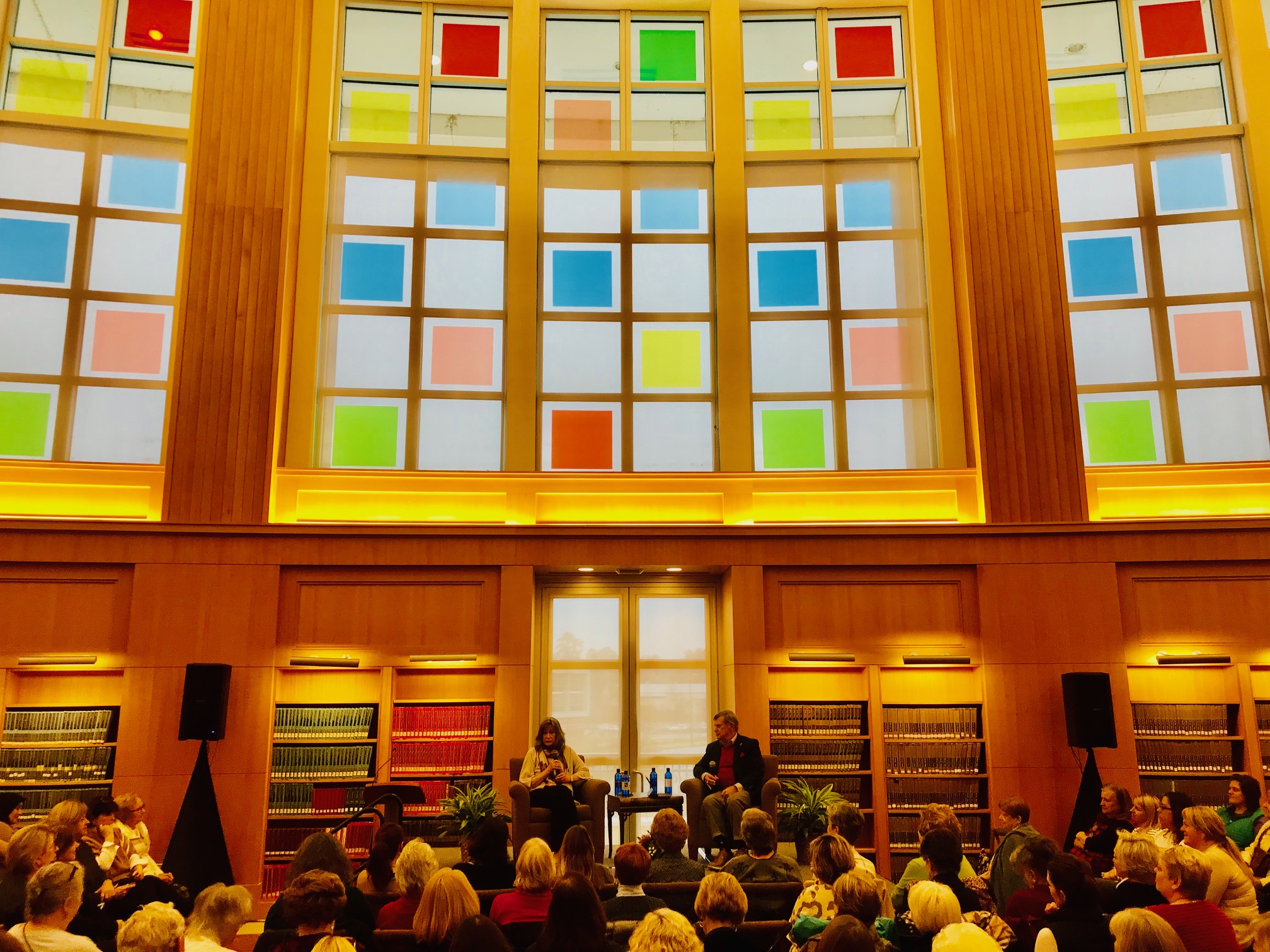
to hear New York Times best-selling author Delia Owns speak.
And a lot of those programs include public workshops.
“Last year was the first time where we had over 100,000 people attending our programs. That was a record for us.We have over 3,000 programs a year. What we try to do is make sure whatever the focus is—in this case,Native American poetry—anything that’s tangentially related, whether it’s the crafts or the music, our staff is just fantastic about doing a big wrap-around and making it interesting.”
What new technologies do you see coming part of the public libraries?
“Everybody is wrestling with e-formats. Because of how the music industry hurt about 20 years ago, everybody else that provides anything electronically, you look at digital-rights management.
You’re paying to lease that digital material. You don’t pay to own it. So for all of our e-books—and our e-books have just rocketed—the cost per unit is higher. I don’t have to pay real estate to shelve them, but I have to pay an annual fee to have access to that book. But when I buy a print book, we get as many uses as we want while it sits on the shelf. So the cost is not where we want it to be.
A lot of people use Audible, which is fine. But we have an audiobook platform people can use. A magazine platform people can use. Graphic novels, comics, music, some video.
I’m really fascinated to see what happens with the industry over the next several years. Unfortunately, a lot of those third-party folks, the numbers are shrinking because they’re buying each other out. Overdrive, which is our biggest vendor for ebooks, just got bought out by a company that buys other companies.
We worry about our customers—they’re very loyal to us.Some people buy Kindles just so they can use our e-content. But where does that go? Are we in the content business? Are we in the providing units business? Because that doesn’t always make sense.
How we continue to stay relevant to customers for e-content is, in my mind, the biggest challenge.”
How do libraries stay current and relevant in the Digital Age?
“We made a number of changes at the library in the last two years. One of which is that we hired somebody who does nothing but select new materials. This is a dream job if you’re an English major.
Jillian Weaver is our selection manager. She’s fantastic. She has $1 million to spend on all our print materials and all our e-materials. She has a degree in library science and has experience doing this. There’s a science to that, but there’s an art as well.
We’ve made changes to our vendors in the last few years. People vote with their feet. And what we’ve seen with e-books, in the last few years with the changes we’ve made, circulation of e-books has gone up by one-third and audiobooks went up by two-thirds. So obviously we’re doing something right if people are continuing to check out more and more stuff.
We had a million items last year for the first time in about 5, 7 years, People are coming back; we have content they want. If we don’t have what people want, they stop using us. So we have to constantly look at that. It’s the art side of how we select.”
Do you think enough people have an understanding of how large the scale of our library system’s operations and offerings are?
“No.
There’s an advantage and a disadvantage to being a public library. Everybody bases their opinion on what their experience was like as a child. That’s good PR, generally. I didn’t have the best library where I grew up. And some of those ladies weren’t very nice. But I had great stuff to read and it turned my life around, personally. And I hear stories about that, viscerally, all the time.
But it also sets an expectations for people of what public-library service looks like. We’re constantly looking at: How can we raise the bar? How can we give people more of what they want? And because we’re publicly funded, in my mind, the more of our community that uses us, that market share, the more effective we are, the more relevant we are.
So we look at what percentage of the population are card-holders. How many books per person are people checking out? Those kinds of measure. We look at the math of it for that relevancy. I really want us to be relevant to our community.
Public means everyone. It’s a daunting task to think you can meet all the people’s needs all the time. We’re sitting at about 23% market share in our community. My dream is for us to get to 40%, 50% of our community actually having a card and using us. I like getting new people to sign up for a card, but it’s that stickiness when they continue to use over time that I’m looking for.”
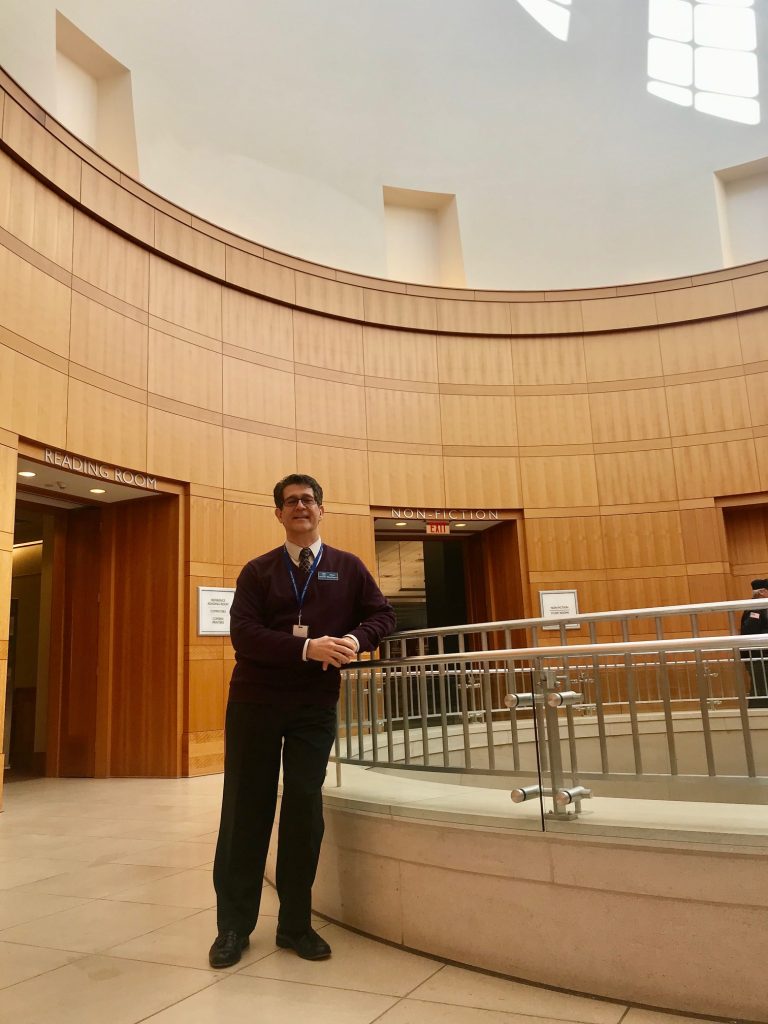
Ultimately, what purpose does a public library serve for its community?
“Every public library needs to look at the community they have and figure out with the community’s help: What does the community need? What is it that the community is looking for? And the library should adjust to that accordingly.
We’ll always have people that want to come in and check out books. That’s fantastic. Children’s reading and programming will always be our bread and butter. Mom and Dad can only have so many videos and books in the house before they start going crazy and they need for content for their kids. We need to have content to feed that need.
But then you start looking at other community needs: How many kids are reading at grade level? Is there a role for the library to play in that? We have an outreach department that does nothing but go out to early-childhood outreach to the day-cares, the pre-schools, the head-starts. To make sure kids are being read to, we’re exposing caregivers to the right practices. If you’re not improving the literacy rate, you’re really doing a disservice to your community.
And that’s certainly something we need help with here. We have a poverty rate above 20%, so we have a lot of work to day, because that reflects the percentage of kids able to read at grade-level when they start school. There’s so many agencies in the community that have a piece to play in that and we want to make sure we have a seat at that table.
That’s one community need. But then we have about 25,000 people a year who come in and do nothing but use our meeting rooms. And that’s fine. We had over 750,000 people walk in our doors over the course of last fiscal year. You’re looking at a couple of thousand people a day using our facilities.
We had over 300,000 people use our public computers last years. If you don’t have a job or the internet at home, this is where you come. Especially in our rural communities—Chattahoochee County, Stewart County, Marion County—the public library is the only place you’re going to get free internet. Try to utilize e-government, as more and more government is going online, when you don’t have internet at home or you’re trying to do it all from a cell phone. It’s about adapting to community needs and making sure we’re meeting that.
For us, our strategic plan is about early-childhood literacy, student success, discovery, awareness. Those are the things we focus on. We make sure all of our activities wrap back around to those strategic-planning elements.”
Chattahoochee Valley Libraries Director Alan Harkness
1.9.2020
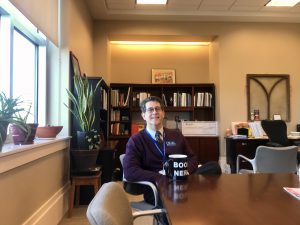
January 2020
Age: 53
Education: Forest Park High School in Clayton County; Bachelor’s degree from Georgia State University; Master’s degree in Library Science, Florida State University
Professional background: “I have worked in public libraries in this state since I was 17. Public libraries is what I do. It’s what I know.
Family: Four kids—28, 17, 13, 9. Wife Amy is a medical-research librarian.
Favorite local restaurant: Seventh Street Provisions (“I’m also a real sucker for the fried chicken at 11th and Bay.”)
# of CVL staff: 122
# of CVL branches: 7 facilities in 4 counties (Muscogee, Chattahoochee, Stewart, Marion). Two bookmobiles. Two 24-hour kiosks (“We’re the first in Georgia to have those.”).
Favorite book: “That’s like trying to pick a favorite child. But, as a son of the South, I have to say, To Kill a Mockingbird.“
Biggest challenge for Chattahoochee Valley Libraries?
“Staying relevant.
We’re getting ready to do an addition renovation project in Cusseta. If the General Assembly passes capital-outlay grants this spring, we’re going to do a renovation/addition project at our South branch. Which is greatly needed; it’s the
smallest library branch we have. A lot of folks need what we have to provide there
We’ve got to look to a new North. People love that North branch. But it’s not in a good place. I can’t add on to it. There’s not enough parking. And the building is at the end of its usual lifespan; it’s about 30 years old. So we’re planning for that.
This line of work is like chess: you really have to look several steps ahead and know how and why. You can’t lose sight of the fact that this is the people’s money, so you have to spend in a way that you think is cost effective and relevant. I don’t want to ever lose sight of that.”
Biggest opportunity for Chattahoochee Valley Libraries?
“I’m a naively optimistic person, so I always go back to: \there’s going to be a program or something we do that will touch a kid. Or we get a user that we’ve never had before, I want to get them hooked. The opportunity is to make those connections. Libraries are all about that relationship you have with the community and that’s what is so important to me.”
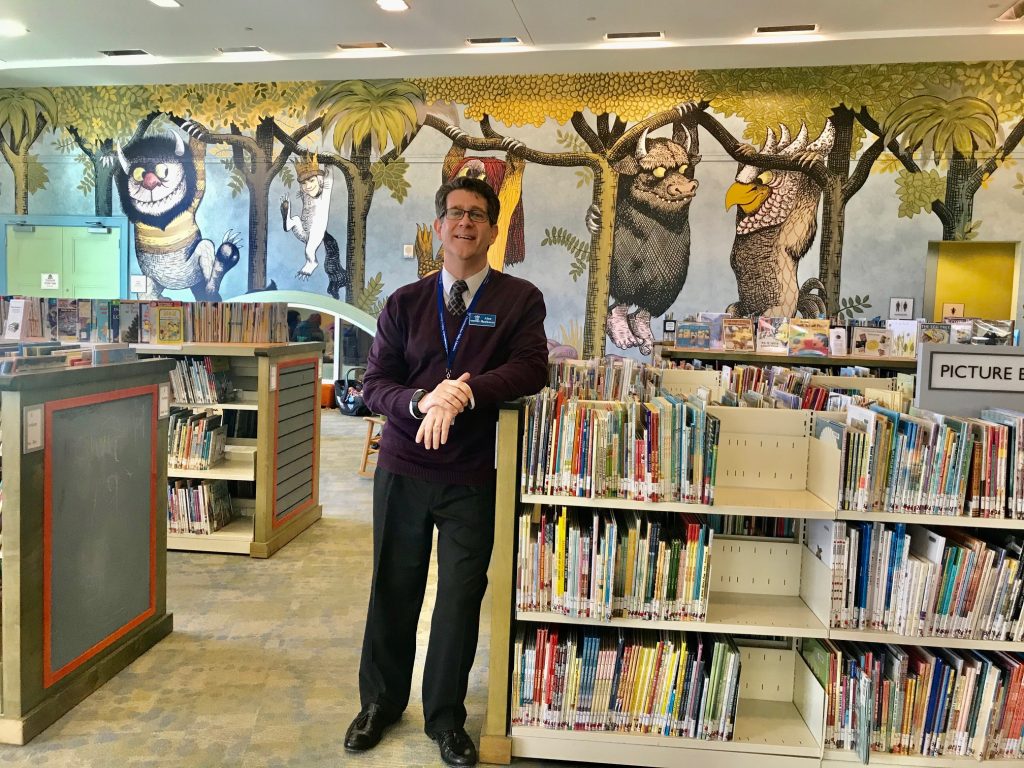
A 2019 mural by Georgia artist Christopher Johnson based on ‘Where the Wild Things Are’ adorns the wall behind him.
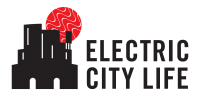
Great interview! We’re lucky to have such an outstanding director & staff running our local library.